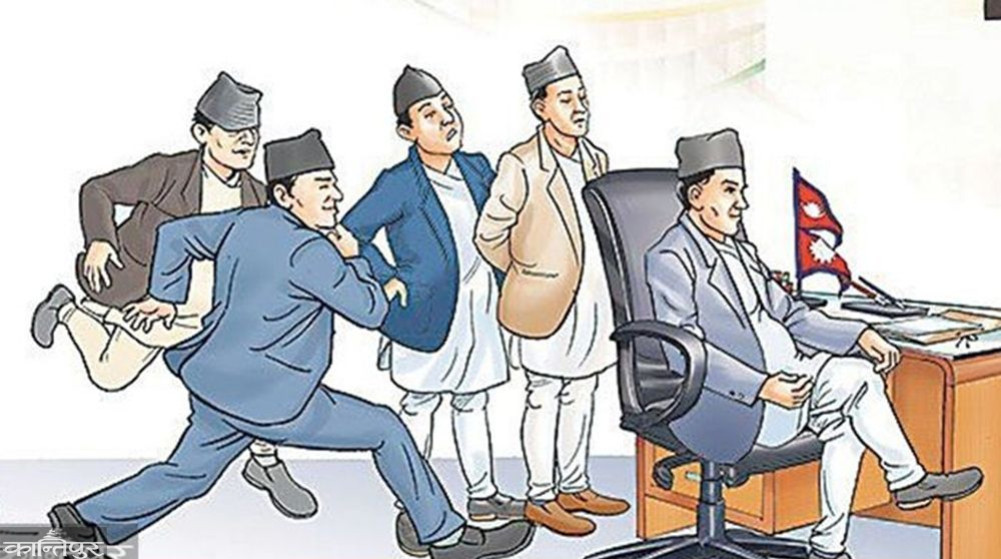Commentary on Giribandhu Purnapatha
We use Google Cloud Translation Services. Google requires we provide the following disclaimer relating to use of this service:
This service may contain translations powered by Google. Google disclaims all warranties related to the translations, expressed or implied, including any warranties of accuracy, reliability, and any implied warranties of merchantability, fitness for a particular purpose, and noninfringement.


Landless peasants were exploited by feudalism until 2021. Even though slavery was abolished, the landless were still treated like slaves by the landowners. In the year 2021, the land law was passed and farmers were given Mohiani rights. The Act fixed the limits of ownership of land. Unlimited land cannot be kept. The extent to which land can be kept in the Terai, Kathmandu Valley and hilly areas for farming and homesteading has been set.



This arrangement was an adventure for social justice. Limits are not set for industries. It was arranged that there will be no restrictions as long as there is industry. After that, it was arranged that the land exceeding the limit would belong to the government. Giribandhu Tea Estate became the 'beneficiary' of this arrangement and the decision of the then government on 11th January 2029 got an exemption of 500 bigha limit 'as long as it is in the work of the tea industry'.
The demand and price of land was increasing all over Nepal. Interest groups in land gradually emerged. Later it came to be called land mafia. Giribandhu Tea Estate was enjoying the facility of delimitation by the Cabinet decision dated 029 Jan 11. The eyes of interest groups fell on the Giribandhu Tea Estate. Without revoking the decision of December 11 and amending the law, the business of land speculation was not possible. The Cabinet was led by KP Sharma Oli. The interest group was able to gain access to the cabinet and get the law amended. A writ was filed against it. The Supreme Court saw no need to amend the Act. Canceled the decision of 2078 Baisakh 13 of Sattapatta.
Nepalese people now know the corruption, abuse of rights, arbitrariness and selfishness of the then government. The laws and regulations were not amended for the development and expansion of industries exempted from restrictions or for the national interest. The amendment was not even made to remove the inconvenience suffered by the industry. The amendment of the Act and the decision of 2078 Baisakh 13 to allow the land to be leased was made with the intention of selling the land after obtaining the approval of the lease after applying to the Shaktikendra. The reward for doing is a matter of common knowledge. No need to mention here. It is incidentally mentioned in the judgment that it is allowed to lease land for commercial transactions including real estate. The amendment of the Act and the decision of May 13, 2078, seeing that the benefits of land transactions are better than those of industrial operations, have cleverly opened the way for those who are getting demarcation facility to apply and obtain a lease permit and earn by doing commercial transactions on the demarcated land. This is evident from the wording in the amended clauses and regulations. Both the
amendment and the decision of 2078 Baisakh 13 are criminal in the eyes of 'law and criminology'. There are four stages of crime. The first stage is planning, the second stage is preparation, the third stage is industry and the fourth stage is completion. The interest group's idea to lease the precious land of Jhapa is a 'plan'. The act of amending the law is 'preparation'. After the amendment of the Act, the act of petitioning the Council of Ministers is 'industry'. The decision of the Council of Ministers on 13th Baisakh 2078 is the completion of the 'criminal act'. Those four steps are a sufficient basis if one is to do research. But the amendment of the Act and the decision of 2078 Baisakh 13 is a daydream that there will be an investigation because it is not from Khardar or Subba but from a class that cannot be touched by Nepalese law.
Although the three organs of the state are of equal importance in their respective rights, the task of moving the country forward is done by the 'executive'. In the US, the 'executive power' is in the President as it is in the Prime Minister. In the 1890s, there was no marshal system for the protection of judges in America. Seeing the threat to the judge's life, the president issued a martial law. Less than two months after the martial law was granted, a judge was attacked. The assailant was killed when Marshall opened fire to defend the judge. There was an uproar that the President provided Marshall without making a law in the US Parliament. The dispute reached the Supreme Court. In the 'Swallow' case, the Supreme Court interpreted 'executive power'. As the president leads the country, the court gave the president 'residuary power', 'stewardship theory' and 'prerogative power'.
The court said, the President does not need any law. He explained that there is a broad right to see whether the existing law has been implemented and even to make a law if there is no law. This principle was also developed by Roosevelt. They were explained on the basis that in a country where the rule of law is established, the chief executive is honest and accountable. It is not imagined that the Chief Executive will work against the national interest by joining factions and groups. The result can be seen from the current situation of former US President Trump. Analyzing the full text of the judgment, it appears that the Council of Ministers, the source of executive authority, is abusing authority, corruption and possible corruption. But the concerned body does not speak.
It was 4 years since the constitution came into effect in 2076. The country was in the grip of Corona. It was necessary to make hundreds of laws and amend many laws based on the mandate of the Supreme Court for the implementation of federalism, fundamental rights and to conclude the peace process, which has not happened till date. The Eighth Amendment to the Land Act was neither necessary nor wanted by the industries. The amendment of the Act was only a desire of some interest groups to make money by doing commercial transactions on the land by leasing the demarcated land. But the amendment of the Act and the decision of 2078 Baisakh 13 proves that the then government was formed not for public interest but for power and power. The government's involvement in amending laws that should not be amended and should not be amended was clearly seen.
No matter how the amendment of the land law seems to have been done maliciously, the land exceeding the limit is not government land, fallow land, barren public land. It is the land of real citizens who have been enjoying it for generations. The government has taken away the compensation of those who have exceeded only because of the limitation set by the law. Even those who are enjoying the facility of restrictions have been given more restrictions on the condition that if they do not run the industry, they will automatically become government. In this way, it is clear that the KP Oli government decided to amend the Act on 13 May 2078 by amending the law for the purpose of discrediting the land that was taken by the property of a group for the public interest without compensation. If the bold 'Landmark' decision of the Supreme Court had not stopped, all the land beyond the limit would have been in the hands of land mafia.
Under Article 133 (2), the Oli government's decision of Baisakh 13, 2078 was annulled. Courts assume that all decisions of the executive are made in the public interest, and do not invalidate them. 5. The court annuls the decision of the Council of Ministers only if the situation is present. (a) contrary to principles of natural justice, (b) exercise of non-existent right, (c) procedural error, (d) violation of law and (e) decision made in bad faith, malice, arbitrariness and abuse of power. In the decision of May 13, 2078, it is clear that the condition of (e) exists. So it was canceled. The provision of the Land Act, which has been exempted from limitation for one class of conducting industry for the public interest, and the decision to allow it to be used in commercial transactions of land in order to benefit another class that has personal interests contrary to the purpose, has been annulled because bad intentions, corruption, arbitrariness and abuse of executive power have been clearly seen.
The Oli government's decision is a priceless gift from the Supreme Court to about 30 million Nepalis and future generations. Bad decisions and abuse of authority are acts of corruption in themselves. As Purnapatha annulled the decision of the Council of Ministers dated 13th of Baisakh 2078, the decision of the Council of Ministers ceased to exist. The door was opened to investigate the Council of Ministers, but the authority understands that the Council of Ministers is not a council of 25 Khardars and Subbas. The file will not be opened.
The authority has recently launched a corruption case against 21 people including the former president in the MDMS scandal of Nepal Telecom. All Nepalis must read and understand the basis taken in that and the basis taken to cancel the decision of 13th Baisakh 2078 in the judgment of the Supreme Court in the Giribandhu Tea Estate scandal. A case was filed on the basis of not doing the work to be purchased in MDMS, not starting the master plan, preparing and approving abnormal costs against the law, preparing wrong documents, etc.
In the full text of Giribandhu's judgment, it is mentioned that the proper reason for the lease was not revealed, the purpose of the establishment of the lease was not ensured, and it was not ensured that the area less than the land used by the Giribandhu Tea Estate would not be purchased.
Similarly, it is not disclosed with which land to be leased, environmental impact assessment is not done, borrowing and abstract terms are mentioned, land cannot be traded, it is mentioned that the purpose for which the limitation exemption has been given cannot be used for other purposes.
It was found that one decision after another was made against the intention of the statute of limitation by the Cabinet. The decision of Baisakh 13, 2078 is completely unfair as the government has indirectly done what cannot be done directly and canceled it. There is no 'corruption' in an administrative decision made unconsciously and ignorantly. The Supreme Court fulfilled its constitutional obligation by canceling the decision of Baisakh 13, 2078. Now the remaining half of the work belongs to the authority.
Former Prime Minister Oli recently said – Congress once allowed 51 bighas and another time 19 bighas to be sold in the name of sattapatta. Taking commission is corruption. Oliji should have taken action against Congress. But he doesn't want to take action. Because he is afraid that the Giribandhu Tea Estate scandal will be a suicide goal against him. Can a person who has become the prime minister sit back knowing that there is corruption in the country? Oli spread confusion and defamed the court by saying that the Supreme Court said to make a law, the law was made and it was canceled according to the law.
After he did not take responsibility in the Giribandhu case and transferred it to others, this writer was reminded of BP Koirala's special court statement in 2034. BP was a great politician not only of Nepal but also of the world. A very serious criminal case was filed against BP on charges of violating panchayat system, against the monarchy and disturbing peace and order by exploding bombs at various places. In his statement before the court, he took responsibility for everything. Other minor activists were also prosecuted. But BP introduced the great politician saying that 'all those crimes were committed by me under my leadership, they are not responsible, I am responsible, if I am to be punished, I should be punished'.
But Oli blamed the government of 051 by concealing his role in amending the Act and in writing dated 13th of Baisakh 2078. He could not even stand by his decision. Oliji should understand the right of equality regarding the sale of land by Congress. The right to equality does not mean that if the Congress has committed a crime by accepting the commission, it should also be exempted. The right to equality means that if the Congress sells the land by taking 19 bigha commission, then Oli has the right to take action against the Congress. This is not only our Supreme Court, but also the Supreme Court of India has spoken about the right to equality in crime.
Even if the full text comes out, the hope of the Nepalese that the file of the Giribandhu tea estate case will be opened, that there will be an investigation, that there will be an investigation on the then Cabinet of Ministers is dead. If the investigation is being done, it can be assumed that there has been improvement in the investigating agency.
– Casey is a former judge.
 प्रकाशित : जेष्ठ ९, २०८१ ०७:३५
प्रकाशित : जेष्ठ ९, २०८१ ०७:३५

 २१.१२°C काठमाडौं
२१.१२°C काठमाडौं
















